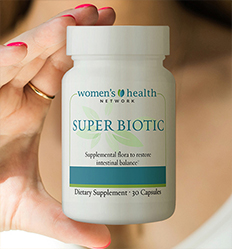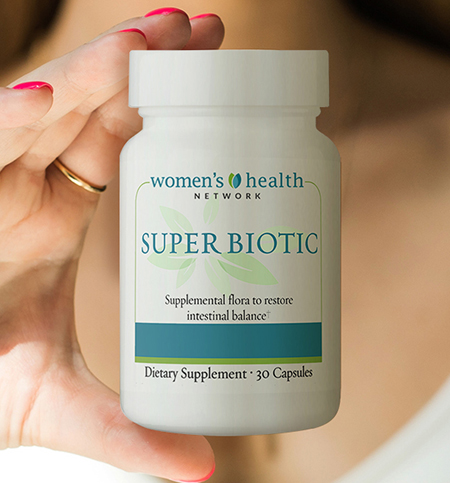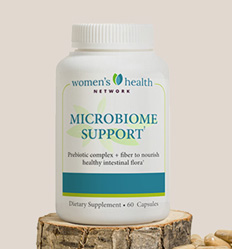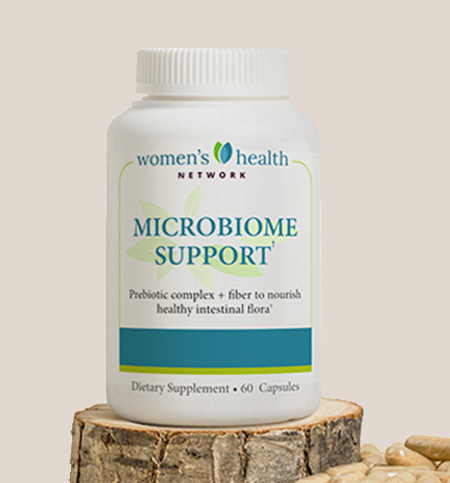Authored by Dr. Mary James, ND
Are you so overwhelmed by your digestive symptoms that you don’t know what to do?
Gastrointestinal distress is more than twice as common in women as men, and women often have it worse because of complicating factors like menstruation, fibromyalgia, migraines and heartburn.

What are probiotics?
While diet is important to finding relief, there are simple, effective steps for rapid relief from issues stemming from a gut flora imbalance, starting with probiotics. Probiotics are supplements of “good” bacteria that are found naturally in your body. They keep “bad” bacteria at bay, and support functions such as digestion, vitamin production and immune balance, and even weight regulation.
When there’s an imbalance, known as dysbiosis, usually caused by “good” bacteria decreasing, which then allows “bad” bacteria to increase — you can feel it. Poor digestion and deficiencies of beneficial microorganisms often lead to a wide range of symptoms, including gas, bloating, cramps, headaches, joint problems and more.
9 signs and symptoms of gut flora imbalance
- Cramps, diarrhea, constipation, bloating, gas
- Gluten, dairy, other food sensitivity
- Yeast infections, cold sores
- Urinary tract infections (UTIs)
- Headaches, migraines
- Stuffy nose, increased mucus
- Joint aches and pains
- Acne, rosacea, skin problems
- Chronic bad breath
Unfortunately, there are many ways your natural gut flora balance can be thrown off, including stress, illness, prescription medications or what you eat. If your digestive system isn’t functioning well enough to break down food and allow for the absorption of the nutrients, your body won’t be able to get what it needs to keep you healthy, or even to function normally.
Fortunately, these “good” bugs can be added through probiotic supplementation to help create and maintain the ideal microbial balance in your gastrointestinal (GI) tract.
7 benefits of probiotics: weight loss, mood and more
Daily probiotic use is an effective preventive and therapeutic method that helps keep your intestinal flora tipped to the positive side, supporting healthy digestion and reducing symptoms. Probiotics also give you the following benefits:
- Regulate fat storage and may help with weight loss
- Affect how we react emotionally
- Facilitate absorption of calcium, magnesium and iron
- Manufacture Vitamin K and B vitamins
- Strengthen the lining of the gut to help block dangerous pathogens, toxins and allergens
- Balance the immune system
- Metabolize and recycle hormones
Probiotics also support healthy digestion when you’re traveling or under lots of stress. The probiotics act as “placeholders” within your intestinal “real estate” as your native flora get reestablished, and can even have indirect effects on your mood.
How to choose the best probiotic
If you are experiencing minor symptoms of gas and bloating after meals, or want to prevent bacterial imbalance due to antibiotics, stress or travel, here’s what to look for in a probiotic:
Find a supplement that contains two key species:
- Lactobacillus species such as L. acidophilus. Lactobacilli strains break down nutrients and help ward off the bad bacteria and organisms that contribute to digestive and/or vaginal imbalance.
- Bifidobacterium is one of the major genera of bacteria that reside in the body. It promotes colon health and enhances cellular immunity.
Choose a probiotic with multiple strains
Different strains have separate effects on your body. For example, S. thermophilus breaks down lactose, the sugar in milk that lactose-intolerant people can’t digest well, and promotes regularity. Our Super Biotic is a powerful blend of eight different strains of “friendly” microorganisms that inhibits the growth of harmful bacteria and yeast, and calms specific symptoms, including bloating, gas and diarrhea.
Check the number of microorganisms per dose
The number should be in the billions. The number of colony-forming units (CFUs) should be listed on the label.
Ensure product purity, safety and quality
Look for a supplement made in a GMP-compliant facility that is certified by the NSF. (These acronyms should also appear on the packaging.)
Choose the best formulation for you
Probiotics come in a wide range of formulations, from encapsulated beads and powders to enteric-coated capsules and liquid functional foods.
What to eat, what to avoid for good gut health
The food you eat, including its pH balance, glycemic load, fiber and essential fatty acid content, all affect the flora in your gut — for better or worse.
Good bacteria feast on healthy fiber from vegetables, legumes, fruits, seeds and whole grains. Foods like garlic, green tea and ginseng contain polyphenols, plant compounds that also foster friendly microbes. And to keep the bad bacteria out, include some real fermented or cultured foods in your daily diet, like miso, kim chi, sauerkraut, kefir, live-culture yogurt and any kind of homemade pickle.
You will also want to try to reduce your intake of sweets, refined flours, alcohol, butter and fatty meats, or avoid them altogether, at least for a while. Steer clear of processed foods and anything containing adulterants like preservatives.
Are you getting enough prebiotics?
Certain foods are rich in fiber molecules called prebiotics, factors that nourish friendly GI flora and set the stage for probiotic survival. Prebiotics help probiotics pass through the acidity of the stomach and small intestine, and foster their growth in the intestines and colon. Examples include fructooligosaccharides (FOS), guar gum, lactulose and inulin.
These natural sugar molecules are found primarily in all kinds of plant-based foods (bananas, artichoke, chicory root, burdock, onions, leeks, fruit, soybeans, sweet potatoes, asparagus, green tea), but also in honey and cultured foods (kefir, cottage cheese, sauerkraut, yogurt).
Research is showing that prebiotics may also help maintain optimal cholesterol levels, stabilize blood sugar and decrease risk for osteoporosis, along with providing diverse additional health benefits.
The Women’s Health Network probiotic solution
Probiotics supply the flora, but you still need a solid foundation of nutrition for these powerful microorganisms to flourish and become established so you’ll be able to take advantage of their potential health benefits. That’s why for healthy digestion and overall wellness we recommend probiotics as part of a combination approach that includes lifestyle and dietary changes, as well as a daily, high-quality multivitamin/mineral.
Drisko JA, Giles CK, Bischoff BJ. Probiotics in health maintenance and disease prevention. Altern Med Rev. 2003 May;8(2):143-55.
O’Hara AM, Shanahan F. The gut flora as a forgotten organ. EMBO Rep. 2006 Jul;7(7):688-693.
Sanchez M, Darimont C, Drapeau V, et al. Effect of Lactobacillus rhamnosus CGMCC1.3724 supplementation on weight loss and maintenance in obese men and women. Br J Nutr. 2014 Apr 28;111(8):1507-1519.
Ho JT, Chan GC, Li JC. Systemic effects of gut microbiota and its relationship with disease and modulation. BMC Immunol. 2015 Mar 26;16:21.
Shukla R, Ghoshal U, Dhole TN, Ghoshal UC. Fecal Microbiota in Patients with Irritable Bowel Syndrome Compared with Healthy Controls Using Real-Time Polymerase Chain Reaction: An Evidence of Dysbiosis. Dig Dis Sci. 2015 Oct;60(10):2953-2962.
Amoils S, Amoils S, Lester T, et al. The Positive Impact of Integrative Medicine in the Treatment of Recalcitrant Chronic daily Headache: A Series of Case Reports. Glob Adv Health Med. 2014 Jul;3(4):45-54.
Hawrelak JA, Myers SP. The causes of intestinal dysbiosis: a review. Altern Med Rev. 2004 Jun;9(2):180-197.
Rolfe RD. The role of probiotic cultures in the control of gastrointestinal health. J Nutr. 2000 Feb;130(2S Suppl):396S-402S.
Rolfe RD. The role of probiotic cultures in the control of gastrointestinal health. J Nutr. 2000 Feb;130(2S Suppl):396S-402S.
Hungin AP, Mulligan C, Pot B, et al. Systematic review: probiotics in the management of lower gastrointestinal symptoms in clinical practice — an evidence-based international guide. Aliment Pharmacol Ther. 2013 Oct;38(8):864-886.
Kennedy PJ, Cryan JF, Dinan TG, Clarke G. Irritable bowel syndrome: a microbiome-gut-brain axis disorder? World J Gastroenterol. 2014 Oct 21;20(39):14105-14125.
Sarowska J, Choroszy-Król I, Regulska-Ilow B, et al. The therapeutic effect of probiotic bacteria on gastrointestinal diseases. Adv Clin Exp Med. 2013 Sep-Oct;22(5):759-766.
Streptococcus Thermophilus. Probiotic.org Web site. https://www.probiotic.org/streptococcus-thermophilus.htm. Accessed April 5, 2016.
Mosele JI, Macià A, Motilva MJ. Metabolic and Microbial Modulation of the Large Intestine Ecosystem by Non-Absorbed Diet Phenolic Compounds: A Review. Molecules. 2015 Sep 18;20(9):17429-17468.
Parvez S, Malik KA, Ah Kang S, Kim HY. Probiotics and their fermented food products are beneficial for health. J Appl Microbiol. 2006 Jun;100(6):1171-1185.
Kelly G. Inulin-type prebiotics–a review: part 1. Altern Med Rev. 2008 Dec;13(4):315-329.
Macfarlane GT, Steed H, Macfarlane S. Bacterial metabolism and health-related effects of galacto-oligosaccharides and other prebiotics. J Appl Microbiol. 2008 Feb;104(2):305-344.














